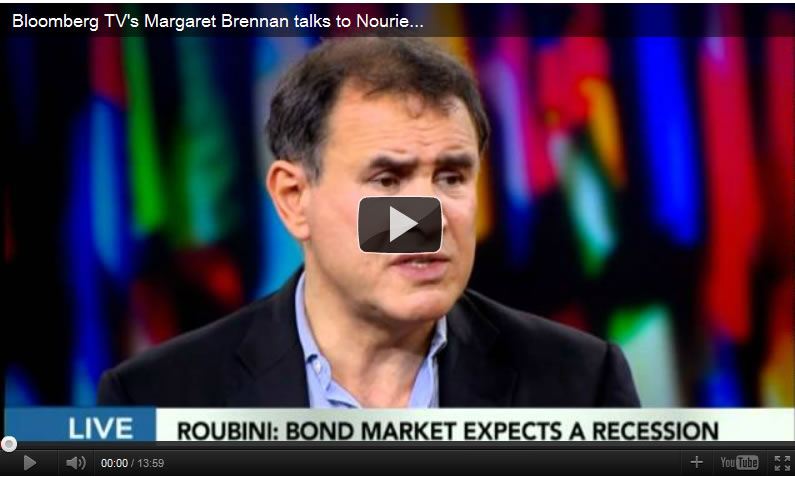Nouriel Roubini 60% Chance of A Double Dip Recession 2012, China and Brazil Also at Risk
Economics / Double Dip Recession Sep 02, 2011 - 03:01 AM GMTBy: EconMatters
 "We’ve reached a stall speed in the economy, not just in the U.S., but in the euro zone and the UK. We see probably a 60 percent probability of recession next year, and, unfortunately, we’re running out of policy tools.....and sovereigns cannot bail out their own distressed banks because they are distressed themselves."
"We’ve reached a stall speed in the economy, not just in the U.S., but in the euro zone and the UK. We see probably a 60 percent probability of recession next year, and, unfortunately, we’re running out of policy tools.....and sovereigns cannot bail out their own distressed banks because they are distressed themselves."
Regarding markets and QE3
"There’ll be more monetary easing and quantitative easing done by the Fed and other central banks, but the credit channel is broken. ...the market is rallying on the expectation of QE3, but I think it will be a short-lived rally. The macro data, ISM, employment, and housing numbers will come out worse and worse, the market will start to correct again."The bond market is already expecting a recession,
"...After the S&P downgrade, bond yields fell from 2.5% to 2% or below. The bond market is telling as a recession is coming and the flattening of the yield curve is telling us that."But since the short-term interest rate is artificially held down low by the Fed,
“Traditionally, you can have inversion of the yield curve. Right now, we have policy rates at 0......We cannot have an inversion because you can have negative long-term interest rates. That’s the reason we don’t see the inversion.”Dr. Doom did not forget about China either,
"I see a hard landing in China as the likely event, not this year or next year, but by 2013 when this over investment move will go bust..... Fixed investment has gone now to 50% of GDP. this over investment boom is going to go into a bust in a hard landing.”
"[Chinese banks] have several trillion dollars yuans and we estimate 30% of these loans will go into default and become underperforming. The heat will be on the Chinese banks.”After the C, he then went on to cover the B in BRIC,
"Brazil has its own other domestic problems, if they do the structural reform that’s needed. It could have high potential growth, but the question is whether the new president will be willing to do those structural reforms to reduce the distortion and increase the potential growth of the country."
Commentary by EconMatters
Shortly after the interview, Bloomberg ran this headline - U.S. Stocks Pare Gains After Rubini Says Recession Is Starting. It might be that markets really rise and fall on the words of Roubini or it could just be Bloomberg pumping its TV news show; regardless, we believe there's not enough clear indication to declare a coming recession yet.
Remember, this is the traditional summer doldrums, and markets are still reeling from the unprecedented downgrade of the U.S. debt by S&P, black swans flocking in Europe certainly has only added to the market turmoil and volatility. So it is logical to see some mixed and somewhat pessimistic data coming out of this current environment, but they are not indicative enough to extrapolate out a recession.
Also keep in mind that 2012, the year when Roubini predicts the recession would hit, is an election year. You can bet the Fed, the Obama Administration, and the Democratic Party will pull out all the stops to stave off a downright recession.
So we think a slow / anemic growth is a more likely scenario; however, this is not to say there's no possibility that Roubini could be right.....again. After all, the man has been predicting double dip for the past four years, and even a broken clock could be right at least twice a day.By EconMatters
The theory of quantum mechanics and Einstein’s theory of relativity (E=mc2) have taught us that matter (yin) and energy (yang) are inter-related and interdependent. This interconnectness of all things is the essense of the concept “yin-yang”, and Einstein’s fundamental equation: matter equals energy. The same theories may be applied to equities and commodity markets.
All things within the markets and macro-economy undergo constant change and transformation, and everything is interconnected. That’s why here at Economic Forecasts & Opinions, we focus on identifying the fundamental theories of cause and effect in the markets to help you achieve a great continuum of portfolio yin-yang equilibrium.
That's why, with a team of analysts, we at EconMatters focus on identifying the fundamental theories of cause and effect in the financial markets that matters to your portfolio.
© 2011 Copyright EconMatters - All Rights Reserved Disclaimer: The above is a matter of opinion provided for general information purposes only and is not intended as investment advice. Information and analysis above are derived from sources and utilising methods believed to be reliable, but we cannot accept responsibility for any losses you may incur as a result of this analysis. Individuals should consult with their personal financial advisors.
© 2005-2022 http://www.MarketOracle.co.uk - The Market Oracle is a FREE Daily Financial Markets Analysis & Forecasting online publication.




